
We tried it: What are the best natural mosquito repellents?
Mosquito protection is a must, and here’s how natural repellents hold up. Find out how they actually work.
Read More

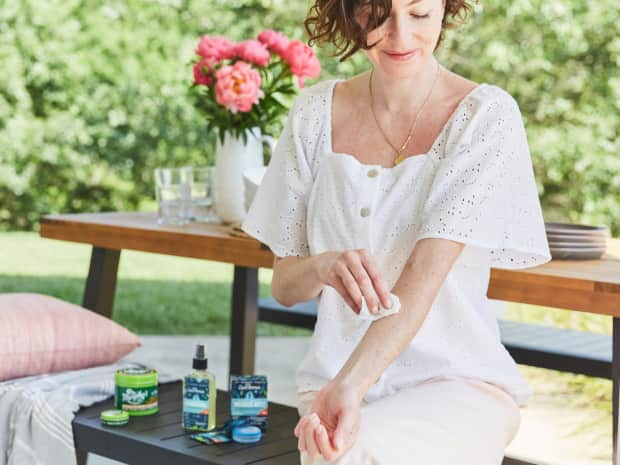
Last Updated: August 9, 2022
Protect your family and home with our rundown of the best plant-based and natural bug sprays & mosquito repellents. We also share if they actually work the way you need them to.
Backyard barbecues, treks on nature trails, and more time spent enjoying the great outdoors are all hallmarks of spring and summer, but the warmer weather also comes with an influx of insects that range from mild nuisances to painful pests.
Luckily, you don’t have to forgo eco-friendliness or natural products in order to effectively protect your family and home from pests. We’ve rounded up the best natural mosquito repellents and bug sprays based on your top concerns, with advice fom the experts.
Natural insect repellents are bug sprays, candles, and other topical and environmental repellents that rely on naturally derived ingredients (instead of man-made chemicals) to keep biting insects at bay. DEET-free natural mosquito repellents and bug balms often rely on a combination of potent essential oils, which combat insects naturally without disrupting the environment or affecting aquatic life.
Since most plants contain compounds as their own protection from insects, plant-derived ingredients are particularly well-suited to prevent bug attacks on humans, too. These essential oils work to disrupt mosquitoes’ (and other bugs’) sense of smell, making it harder for them to find and bite you.
In addition to being better for the environment, switching to a natural insect repellent can also benefit your outdoor gear, your furry friends, and even the bugs you're trying to repel. While no one wants mosquitos at barbecues, insects are critical to a healthy ecosystem: Without insects to pollinate them, most flowering plants would die out! Grove's bug repellents are designed to deter insects based on natural fragrances, rather than use harmful chemicals, such as DEET.
“DEET degrades plastics, so your camping, hiking, or fishing gear may be damaged, plus it even damages watch crystals,” says Philip Freeman, founder of Murphy’s Naturals, which produces plant-based insect repellents. Even if you’ve found a DEET-free insect repellent, “other synthetic repellents on the market can be harmful to pets and aquatic life,” he says. “So it’s essential to read the ingredient warning labels before purchase.”
A chemical that structurally resembles DDT and is toxic to fish and bees.
Both thought to potentially cause neurotoxic effects.
Commonly found in paraffin-wax mosquito candles. (Look for soy and beeswax-based candles instead.)
DEET is a chemical that repels insects by making it hard for them to smell out what they like about humans. But, it can irritate your skin and eyes as well as cause other sicknesses if ingested, according to the National Pesticide Information Center.
Did you know?
“Health concerns aside, all federally registered insect repellent actives must undergo substantial animal testing in order to be approved,” says Iris Piedmont-Fleischmann, director of sales for Badger, which makes all-natural skin and body care products including insect repellent.
You can help reduce the demand for animal testing by choosing simple, natural products; the EPA doesn’t consider botanicals to pose any serious safety risk and doesn’t evaluate plant-based repellents.

Natural insect repellents are as effective as their conventional counterparts, but read the active ingredient list and application recommendations — sometimes you have to pay a little more for the most effective bug bite prevention.
“If a natural bug repellent doesn’t work well, it’s because the brand didn't put a high enough concentration of repellent essential oils in its products,” says Freeman of Murphy’s Naturals. “These essential oils are costly, but effective repellency comes from using a high concentration of those repellent essential oils, plus applying a combination of various oils, rather than just one oil like citronella.”
Like insects, not all oils are the same, so the oil repellency impact varies depending on the insect. You’ll get a broader spectrum of insect repellency by using high concentrations of different oils in combination.
The only plant-based repellent advocated for use by the CDC against malaria, this eucalyptus oil can be used solo for maximum bug protection. The key is the PMD fermentation process, which increases the effectiveness of the oil. “We find lemon eucalyptus is the most effective as a topical repellent,” says Freeman.
Some studies show that citronella oil can be just as effective at repelling mosquitoes as DEET, but it does evaporate quickly, so it’s best in candles or when mixed with other bug-fighting ingredients.
Your herb garden comes with an added bonus: These plants have been shown to repel mosquitoes. While the oil of each tends to be best, even the potted plants can offer some mosquito-fighting effect.
Lemongrass essential oil can be used solo or combined with other oils to stave off mosquitoes for a few hours, as well as other flying and biting things. While you can apply an essential oil topically, it’s best to look for a product that contains lemongrass along with other ingredients for the most comprehensive protection from biting insects.
Did you know?
And if you can smell the product, you’ll know it’s working. “Our products smell like citronella, lemongrass, geranium, and other essential oils. It’s the fragrance that makes [Badger products] work – not some odorless chemical,” says Piedmont-Fleischmann. “We’ve seen reviews that say it smells strong, but that’s the point!”
Solution: A natural bug spray and insect repellent bug balm are often an effective one-two punch for natural newbies. Sprays tend to last longer but smell a little stronger, while a balm is great for topical application with less of a scent — ideal for when you need to cover up small areas of exposed skin, like ankles.

Solution: For kids who are sensitive to smells and prone to squirming, a bug repellent balm stick offers no-touch application with a less fragrant formula than most sprays (and the CDC advises against using oil of lemon eucalyptus on kids younger than three). Or try a mosquito-repellent wipe, which relies on essential oils, soybean oil, and vitamin E for insect bite prevention for up to four hours.
If you’re sending your little ones outdoors and dread the thought of having to tackle both sunscreen and insect repellent application, consider a two-in-one formula.
“The sunscreen base works as a great fixative for the repellent essential oils, so this is a long-lasting formula,” says Piedmont-Fleischmann.

Solution: Consider a combination of a candle and insect repellent incense sticks to create a “no-fly” zone. While they can be used independently of each other, the candle-stick combo is part of what Freeman calls the “point and perimeter” method.
“Our recommendation is to place the incense sticks in a perimeter around your patio to create a first-level barrier to mosquitoes, and then a candle at the point where you are enjoying the outdoors for those few mosquitoes that make it past the perimeter,” he says.
Solution: Whether hiking with the dog or camping over a long weekend, you’ll likely want a DEET-free spray (Remember that note about degrading gear?) that can cover both your body and your stuff. But don’t count out a balm.
“A spray is great for clothing and is really easy to use, but the balm formulas remain effective for a bit longer, so using a combination is a great idea,” says Piedmont-Fleischmann. “A travel bug stick is a great way to get spot protection: behind ears, or on ankles, or wrists. For big jobs, the balms in tins are great — even for horses, dogs, or donkeys.”
Solution: If you’re concerned about specific diseases, you’re going to want an ingredient that’s been lab- and field-tested specifically against them. Lemon eucalyptus oil is so effective as a natural repellent, the EPA allows Murphy's Naturals to put a disease claim on its Lemon Eucalyptus Oil Spray: “Repels mosquitoes that can carry Zika Virus, West Nile Virus, Dengue Virus, and Chikungunya Virus.”
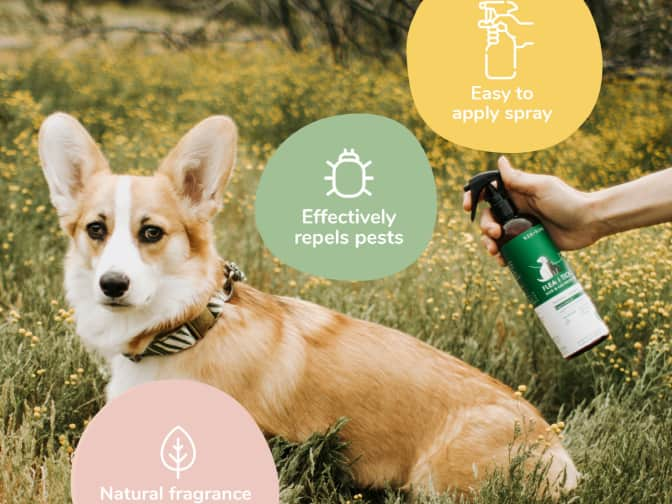
Solution: The Badger balms in tins can be used on some animals, like horses, dogs, or donkeys, but some essential oils aren’t good for cats.
For flea and tick protection, consider a spray like the one from kin+kind, which can be used before walks and hikes or sprayed weekly on your dog’s coat for general protection. You can also use the spray on bedding, but be sure to spot test a portion of the fabric first.

Solution: Both Murphy’s and Badger offer natural bug bite relief balms that help soothe the itch, and since both are plant-based, you can apply (and reapply) as much as needed — just make sure to test a small area first for any sensitivities to essential oils.
Though natural, essential oils may be too strong for sensitive skin types. Badger’s Bug Bite Relief Balm uses cooling peppermint oil for relief, plus a variety of antioxidant- and vitamin-rich oils to give your skin a boost.
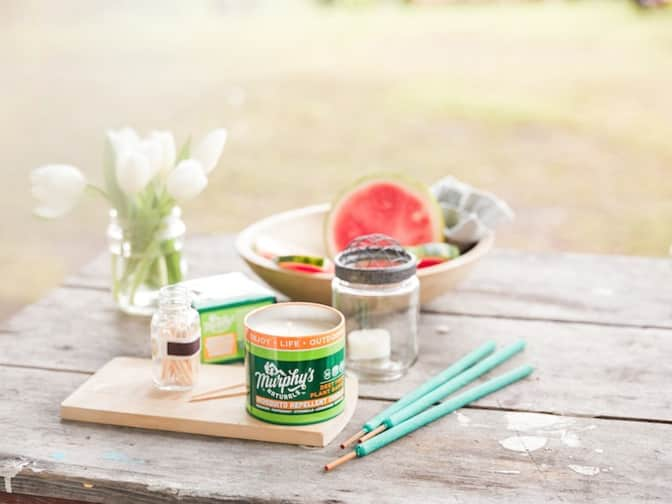
Veteran owned, family operated, and a certified B corporation, Murphy’s Naturals started when founder Philip Freeman was looking for a natural mosquito repellent for his “mosquito magnet” wife. Eager to avoid DEET and other chemical-based products, Freeman tried alternatives, but found they were either ineffective or not as natural as they seemed.
“The lack of a readily available, highly effective plant-based repellent products was the ‘a-ha’ moment for me,” says Freeman. “I thought there must be a lot of people with the same challenge. After a lot of self-testing, I developed a plant-based formulation that worked.”
Murphy’s Naturals uses a high level of essential oils, plus natural waxes like soy and beeswax, for an all-natural and effective way to repel mosquitoes. “Our products are made from sustainable ingredients and our packaging is made with the purpose to reuse, recycle, and reduce materials,” says Freeman. “Many of our ingredients support local communities from where they are sourced, ranging from the Brazilian Amazon to the grasslands of Malawi.”
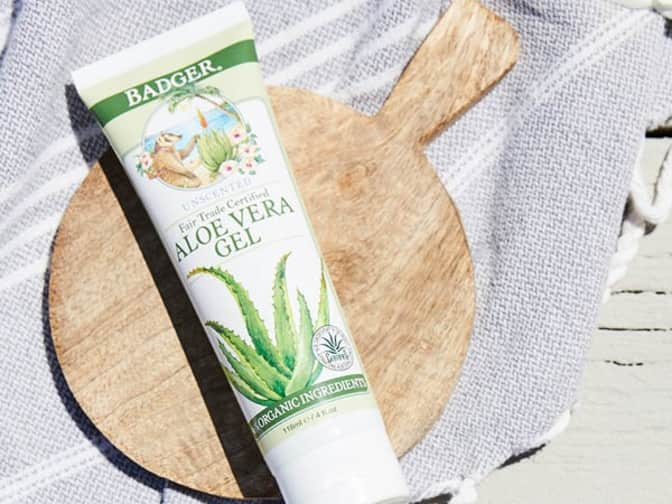
Another family-run B corporation, Badger was founded more than two decades ago by New Hampshire carpenter Bill Whyte, who wanted a balm to help soothe his cracked hands. His product was a hit with his construction friends, and soon spurred expansion into a whole line of products. Now run by his daughters, Badger produces all-organic body and skin care products that fit the brand’s rigorous natural standards for healthy agriculture, minimal processing, sustainable supply chain, and health-giving properties.
“Our insect repellents are formulated with all-natural and certified-organic ingredients, including essential oils that have insect-repelling properties,” says Piedmont-Fleischmann. On top of containing top-notch ingredients, the products work. Badger lab-tested its formulas to make sure they were effective: Anti-Bug Spray provides more than three hours of protection, just to name one superstar.
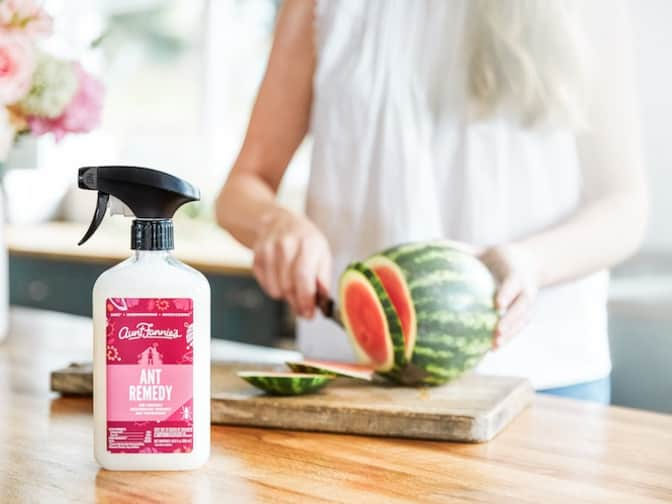
Okay, so it wasn’t created by an actual “aunt,” but Aunt Fannie’s founder Mat Franken named the company after his grandma, a “woman with enough life force and common sense to set this whole world straight,” he says in his interview with Grove. Franken started the company when his toddler’s health problems were traced back to autoimmune problems, and has since set out on a mission to let nature work how it’s intended by harnessing its cleaning properties into Aunt Fannie’s products.
Although best-known for its plant-based household cleaning supplies, Aunt Fannie’s also produces handy mosquito-repellent wipes and sprays, including a spray formulated with kids specifically in mind. The wipes can be used on children six months and older, and are made from a non-bleached material and biodegradable. Essential oil–powered and DEET-free, Aunt Fannie’s insect repellent products don’t just end at topicals; the brand also produces a line of household insect sprays and remedies, including a fruit-fly trap, ant remedy, roach remedy, and an all-purpose pest spray. And Aunt Fannie’s vets its products via third party standards and testing. Plus, the bottles and cans are recyclable.

Mosquito protection is a must, and here’s how natural repellents hold up. Find out how they actually work.

Born out of a need to protect his family, and others like them, Mat Franken founded Aunt Fannie’s to make truly clean, green household products.
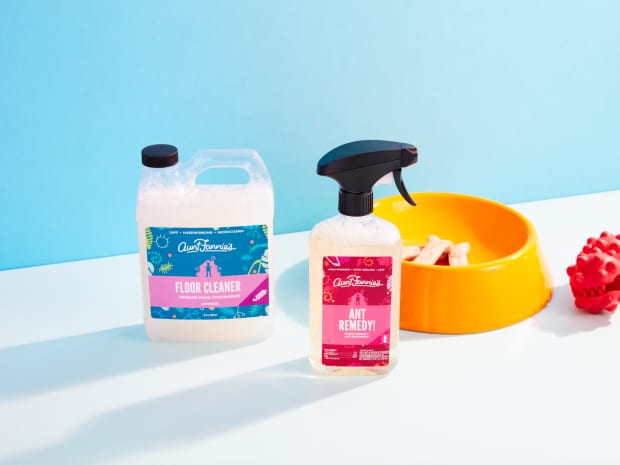
When ants go marching two by two, three by three, or four by four into your home, steer them back out with natural repellents—and keep them out.

Read on to find out how to easily clean your tent and other camping gear with natural products so you can explore the planet sustainably.